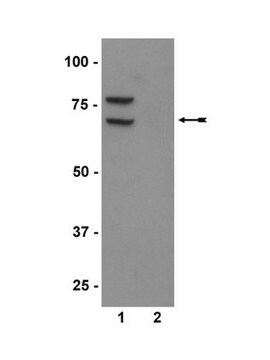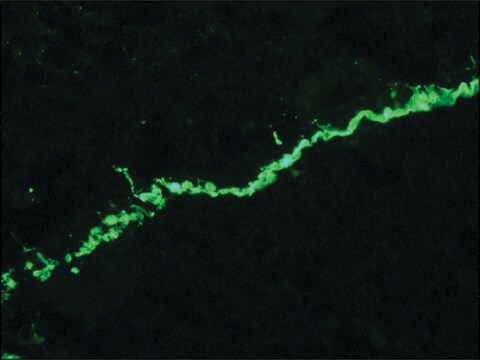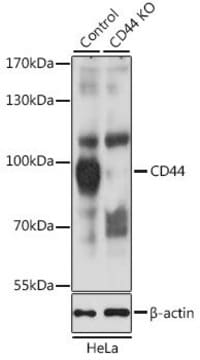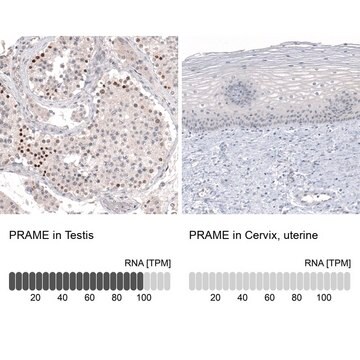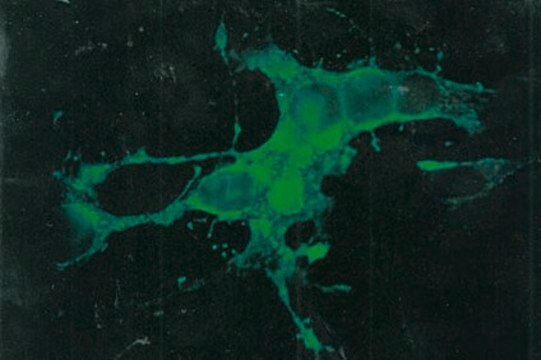MAB8906
Anti-Measles Antibody, nucleoprotein, clone 83KKII
clone 83KKII, Chemicon®, from mouse
Synonym(s):
Rubeola
Sign Into View Organizational & Contract Pricing
All Photos(1)
About This Item
UNSPSC Code:
12352203
eCl@ss:
32160702
NACRES:
NA.41
Recommended Products
biological source
mouse
Quality Level
antibody form
purified immunoglobulin
antibody product type
primary antibodies
clone
83KKII, monoclonal
species reactivity
human
manufacturer/tradename
Chemicon®
technique(s)
ELISA: suitable
immunocytochemistry: suitable
immunofluorescence: suitable
isotype
IgG
shipped in
wet ice
General description
Measles is a highly contagious, acute febrile illness that has been one of the most common viral diseases of young children. Although measles has been effectively controlled in recent years by the use of live attenuated virus vaccines, measles continues to have a serious impact on human health as evidenced by its continued persistence in developing countries. Measles is characterized by a prodrome illness with rapidly rising fever that culminates in a generalized macular-papular rash. The appearance of Koplik′s spots on the mouth epithelium during or after the prodromal phase is pathognomonic for measles. The measles virus belongs to the family Paramyxoviridae, and is a member of the genus Morbillivirus. Measles is an enveloped, pleomorphic virus ranging from 100 to 250 nm in diameter with a single stranded linear RNA. Infected cells contain large amounts of nucleoprotein antigen which is the major internal protein of measles virus. Consequently, the dominant part of the antibody response to measles virus involves the nucleoprotein antigen.
Specificity
MAB8906 recognizes the measles nucleoprotein by capture EIA.
Immunogen
Epitope: Nucleoprotein
Application
Capture ELISA: A 1:5,000-1:10,000 dilution of a previous lot was used in ELISA.
Indirect Immunofluorescence: A previous lot of this antibody was used on indirect immunofluorescence.
Immunocytochemistry Analysis: A 1:100 dilution from a representative lot detected the measles nucleoprotein in cells infected with measles virus.
Optimal working dilutions must be determined by end user.
Indirect Immunofluorescence: A previous lot of this antibody was used on indirect immunofluorescence.
Immunocytochemistry Analysis: A 1:100 dilution from a representative lot detected the measles nucleoprotein in cells infected with measles virus.
Optimal working dilutions must be determined by end user.
Research Category
Infectious Diseases
Infectious Diseases
Research Sub Category
Infectious Diseases - Viral
Infectious Diseases - Viral
This Anti-Measles Antibody, nucleoprotein, clone 83KKII is validated for use in ELISA, IF for the detection of Measles.
Physical form
Format: Purified
Protein A purified
Purified mouse monoclonal IgG in buffer containing liquid in PBS with 0.1% sodium azide.
Storage and Stability
Stable for 1 year at from date of receipt.
Analysis Note
Control
Measles Control Slides, Catalogue Number 5031-5
Measles Control Slides, Catalogue Number 5031-5
Other Notes
Concentration: Please refer to the Certificate of Analysis for the lot-specific concentration.
Legal Information
CHEMICON is a registered trademark of Merck KGaA, Darmstadt, Germany
Disclaimer
Unless otherwise stated in our catalog or other company documentation accompanying the product(s), our products are intended for research use only and are not to be used for any other purpose, which includes but is not limited to, unauthorized commercial uses, in vitro diagnostic uses, ex vivo or in vivo therapeutic uses or any type of consumption or application to humans or animals.
Not finding the right product?
Try our Product Selector Tool.
Storage Class Code
10 - Combustible liquids
WGK
WGK 2
Flash Point(F)
Not applicable
Flash Point(C)
Not applicable
Certificates of Analysis (COA)
Search for Certificates of Analysis (COA) by entering the products Lot/Batch Number. Lot and Batch Numbers can be found on a product’s label following the words ‘Lot’ or ‘Batch’.
Already Own This Product?
Find documentation for the products that you have recently purchased in the Document Library.
Measles virus entry through the signaling lymphocyte activation molecule governs efficacy of mantle cell lymphoma radiovirotherapy.
Miest, TS; Frenzke, M; Cattaneo, R
Molecular Therapy null
Daria Jacob et al.
PloS one, 9(1), e86658-e86658 (2014-01-30)
Yeasts are largely used as bioreactors for vaccine production. Usually, antigens are produced in yeast then purified and mixed with adjuvants before immunization. However, the purification costs and the safety concerns recently raised by the use of new adjuvants argue
Adherens junction protein nectin-4 is the epithelial receptor for measles virus.
Muhlebach, MD; Mateo, M; Sinn, PL; Prufer, S; Uhlig, KM; Leonard, VH; Navaratnarajah et al.
Nature null
Lung involvement in childhood measles: severe immune dysfunction revealed by quantitative immunohistochemistry.
Talib Moyses Moussallem,Fernanda Guedes,Elaine Raniero Fernandes,Carla Pagliari et al.
Human Pathology null
Ludmila Perelygina et al.
Frontiers in immunology, 12, 796065-796065 (2022-01-11)
Rubella virus (RuV) has recently been found in association with granulomatous inflammation of the skin and several internal organs in patients with inborn errors of immunity (IEI). The cellular tropism and molecular mechanisms of RuV persistence and pathogenesis in select
Our team of scientists has experience in all areas of research including Life Science, Material Science, Chemical Synthesis, Chromatography, Analytical and many others.
Contact Technical Service


